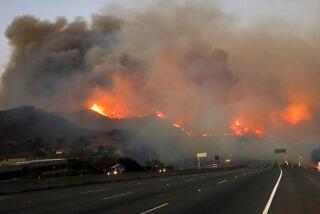L.A. Calls for Countywide Emergency Radio System
The Los Angeles Police and Fire departments should develop a radio system that will allow them and public safety agencies throughout Los Angeles County to more easily communicate in a disaster, a city panel recommended Monday.
The endorsement came even though county agencies still must find up to $604 million to pay for their part of the project.
The City Council’s Public Safety Committee recommended that the city support legislation and other action that would provide money for construction of an interagency radio system while also preparing to build an independent citywide system if other agencies do not go along.
“This is a major step forward,” said Councilman Bernard Parks, a former police chief.
The action came after a private consultant completed a study that concluded it is feasible to build a regional radio system for public agencies and recommended that they pool resources to pay for the project.
Fire Chief William Bamattre said the LAPD and other agencies that are buying new radios are selecting equipment that would be compatible with a countywide link during emergencies.
Council members noted that some emergency workers in New York City’s World Trade Center on Sept. 11, 2001, could not hear evacuation orders in radio transmissions from helicopters operated by other public safety agencies.
“The technology complexities that loom are still quite significant, but I think the key is you now have all the major entities in the region operating off the same page as the same team,” said Councilman Jack Weiss.
In other action Monday, the council committee also recommended that a two-month contract extension be provided to the monitor assigned by a federal judge to oversee LAPD reforms mandated by a consent decree.
The judge recently extended the consent decree by three years, but the city wants more time to negotiate terms for the new contract.
The panel agreed to the extension with Kroll Associates even though Councilman Dennis Zine wondered if a new firm should be brought in because of his concern about the neutrality of the monitor, who benefits financially from having the consent decree renewed.
More to Read
Sign up for Essential California
The most important California stories and recommendations in your inbox every morning.
You may occasionally receive promotional content from the Los Angeles Times.











